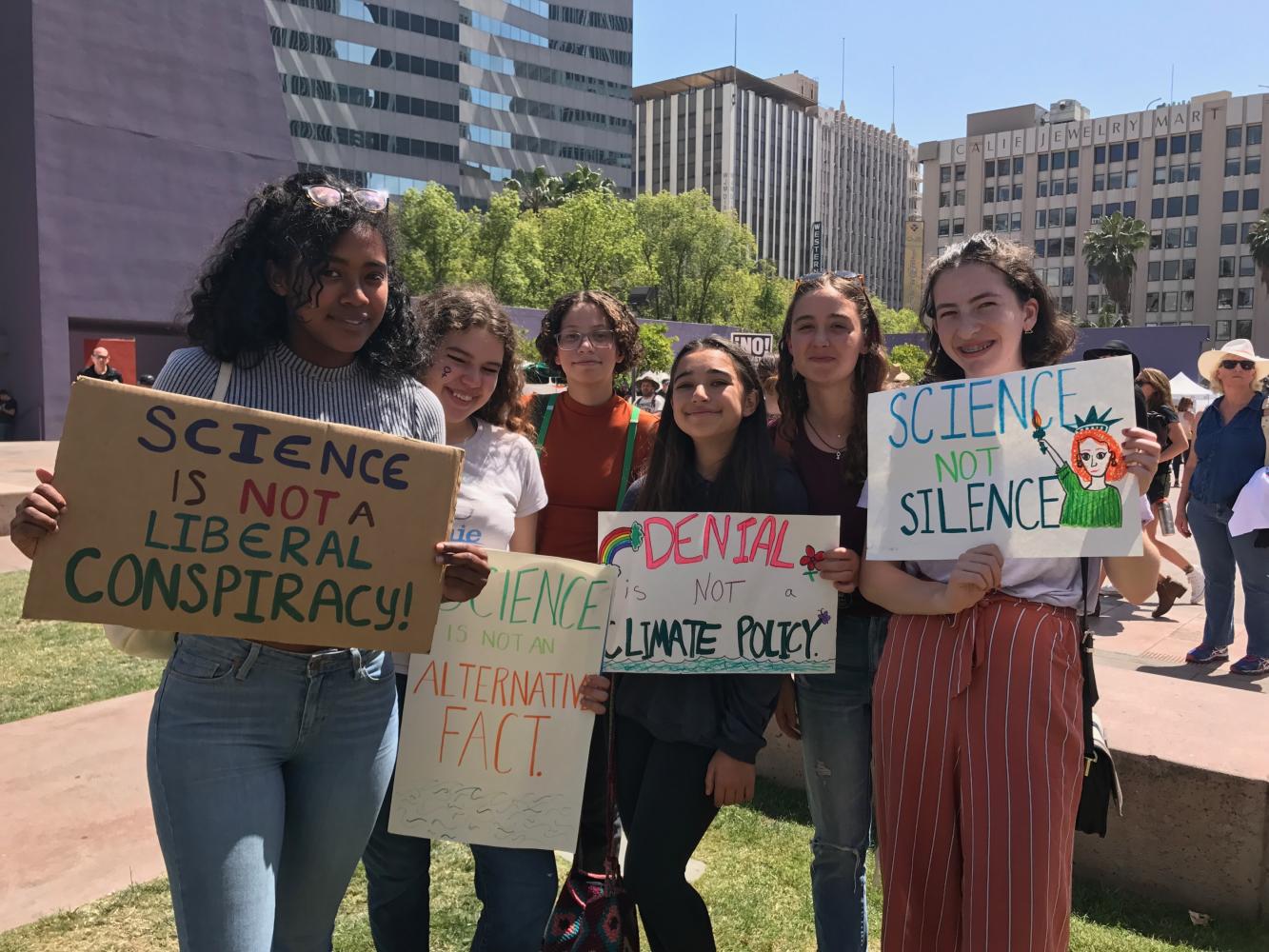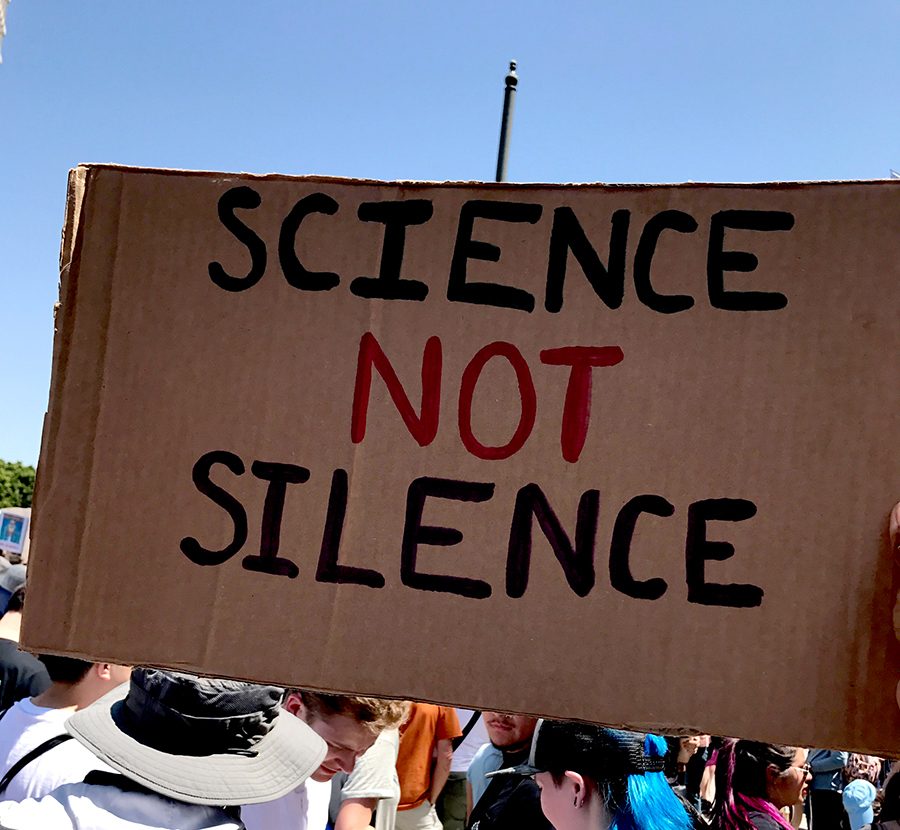‘There is no Planet B’: Thousands March for Science in L.A.
On Earth Day 2017, Pershing Square Park was filled with science, not silence.
Exactly three months after The Women’s March, over 50,000 scientists and STEM lovers alike gathered in downtown Los Angeles to take a stand for science in politics. Demonstrators chanted slogans such as, “What do we want? Evidence-based policy. When do we want it? After peer review,” and displayed their homemade signs saying “There is no Planet B” and “Science is not an alternative fact.”
The main event took place in Washington D.C. on the National Mall, but there were about 600 satellite marches that took place all over the world. The march in downtown L.A. was one of more than 40 in the state of California alone.
According to the website, the March for Science was a celebration of the crucial roles that science has in affecting economic growth, protecting the environment and the health of the people. The goal of the march was to unite as a diverse, nonpartisan group to call for elected officials and policymakers to fund science that uploads the common good and to advocate for them to rely on scientific evidence when making policies at local, state and national levels.
“The March for Science is a celebration of science. It’s not only about scientists and politicians,” the website continues. “It is about the very real role that science plays in each of our lives.”
For Sidney Velasquez ‘19, the vital role that science plays in her live is what drove her to participate.

“I decided to attend because as a person in science, a woman in science and a woman of color in science, I see the value of having science involved in policy, especially in the political climate that we have now,” she said.
As a sophomore, Velasquez doubles up on science classes by taking both Honors Research and Honors Biology.
“I decided that since I am so passionate about science and about politics, that I would use my passion to drive me to march,” said.
For Livia Blum ’19, although she is not particularly passionate about science or pursuing science, she wanted to support her friends who are.
“It is also incredibly important during this time period in American history that the American people who believe in equality and creating a just world support each other through each and every endeavor,” Blum wrote in an email interview.
The march’s main events officially started at 9 a.m. in Pershing Square, and after a 10 a.m. rally, the crowd marched to City Hall at 11 a.m. Speakers had expertise from different scientific fields, and non-scientists such as House Rep. Brad Sherman (D-Calif) and “Hidden Figures” screenwriter Allison Schroeder also spoke.
Along with the march was a Science Expo from 9 a.m. to 4 p.m. with booths run by different organizations, including the American Lung Assn. and the Center for Biological Diversity, interactive demonstrations and other activities for people of all ages.
Although the march claims to be nonpartisan and not directly specifically targeted at President Donald Trump, the L.A. Times reports that many marchers were driven to participate because of Trump’s proposed budget with across-the-board cuts to scientific research. In addition, it also indicated that Trump is planning to cut spending for the National Institutes of Health and other government research pertaining to climate change.
“It’s a bit difficult watching political leaders questioning the importance of science, climate change, abortion rights and things like that — which are so, so heavily correlated with science and fact,” Velasquez said.
Blum echoed Velasquez’s remarks.
“There is no excuse for ignoring the crisis of climate change and the threat it poses to all living beings on earth. Indifference is not simply indifference,” she wrote, “Being a bystander is being a perpetrator and the Trump Administration needs to move past their self-centered and greedy values and do their part to save our planet, our nature and our only true form of life.”
The Marches for Science are just the beginning. The organizers are calling this week, April 23-29, “A Week of Action,” where they will promote daily actions to continue the marches’ momentum and continue to defend and strengthen science’s role in society.
Blum acknowledges that marching only once is not enough. She plans to continue to attend every protest and march that she can and to live by the values and principles that she will advocate for every day. She also expressed how unifying and empowering the marches have been for her.
“Being out in public during events like the Women’s March and the March for Science is really, really beautiful, because everyone talks to everyone and it feels like you are connected to the people around you, because you are all united in your fight for equality and representation,” Blum wrote. “I felt at home in my city and the people around me carrying signs advocating for the protection of our earth felt like my family.”

Cat Oriel joined the Oracle staff as a contributing writer in 2015, was promoted to Voices Editor in 2017 and is now the News and Features Editor. She...










